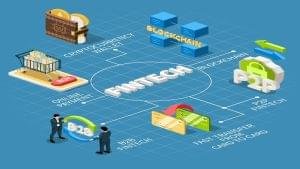Financial technology, or FinTech, refers to the ever-changing convergence of financial services and technology. FinTech is a phrase that is frequently heard in the media and in everyday speech. While many people use the phrase FinTech, its precise meaning is frequently lost somewhere along the route.
Many entrepreneurs employ technology to cut the cost of existing manual financial services and usually offer new tech-driven solutions. To drive innovation, incumbent and emerging financial firms seek to purchase or collaborate with startups. Many technology firms offer payment tools. These are all examples of FinTech.
What Exactly Is a FinTech Company? Who is responsible for this?
When most people think about FinTech, they envision startups or entrepreneurs breaking into markets that have long been dominated by banks and other legacy financial institutions. However, there are numerous types of FinTech firms. Let’s have a look at a few of them:
- Bank of America, Chase, Wells Fargo, and Allstate are examples of huge, well-established financial firms. These are sometimes referred to as “incumbents.”
- Apple, Google, Facebook, and Twitter are examples of large technology businesses that are active in the financial services industry but are not solely focused on finance.
- Companies that provide technology or infrastructure to support financial transactions. Companies in this category include MasterCard, Fiserv, First Data, numerous financial market utilities, and exchanges such as NASDAQ.
- Disruptors are fast-moving companies, frequently startups, that are focused on a specific breakthrough technology or procedure. Stripe (mobile payments), Betterment (automated investing), Prosper (peer-to-peer lending), Moven (retail banking), and Lemonade (insurance) are examples of such companies.
- Many accounting and business advising organizations automate their day-to-day business procedures with ERP software such as Deskera. Companies can boost their accounting department productivity by utilizing ERP software.
FinTech was viewed as a means to a goal, a platform that serves as a data processing center. However, as the digital era progresses and COVID-19 has an impact on the economy, there have been notable demographic shifts in the way people think and their technological needs. Everyone prefers to use internet or mobile apps or sites. FinTech is now the foundation for end-to-end communication processing via cloud services.
Let’s take a look at six industries that will be impacted by FinTech in 2020.
FinTech is disrupting six industries
Let’s take a look at how FinTech is being used in 2020 and what some of its typical applications are.
1. Crowdfunding Website
Many companies, such as Patreon, Kickstarter, and GoFundMe, are examples of FinTech outside of traditional banks. Crowdfunding systems, in essence, allow internet and app users to receive or send money from others on their platform, as well as enabling people or businesses to pool financing from multiple sources all in one area.
Rather than seeking a loan from a bank, it is now possible to seek assistance for a company or project directly from investors. Their proposals can range from funding from family and friends to cash from fans and patrons. The number of crowdfunding platforms has grown in recent years.
NYDOZ Fintech Company
NYDOZ is a global leader in financial technology, creating the solutions that will define the lives of every participant in the global economy.
Clients can begin investing with as little as $1. We have three primary plans: Gold, Silver, and Bronze, each with its own interest rate and term duration. Investing in Nydoz will yield a set return. Concerning our three distinct policies:
- Gold – Investing in gold will earn you a 15% yearly return and keep your money safe for up to 36 months.
- Silver: If you invest in silver, you may expect a 12% annual return and your principal to be retained for up to 24 months.
- Bronze: If you invest in Bronze, your money will be held for up to a year and you will receive a 9% yearly return.
The client can withdraw his or her interest on a monthly basis. Your principal will be held until the conclusion of the term period. A set and large monthly income, a reasonable refund policy, safe investments, convenience of access, and openness are some of the deciding factors for investing in Nydoz.
2. Blockchain technology and cryptocurrency
FinTech includes cryptocurrency and blockchain. Cryptocurrency exchange systems such as Coinbase and Gemini allow users to purchase and trade cryptocurrencies such as bitcoin and litecoin. Similarly, blockchain services such as BlockVerify aid in the reduction of fraud by storing provenance data on the blockchain. Cryptocurrency has certainly grabbed segments of the investment world by storm in recent years.
3. Payments via mobile devices
In today’s generation, mobile payments have become the norm. Almost everyone who owns a smartphone makes use of some type of mobile payment. Consumers can interchange money and payments online or on mobile devices using mobile payment technologies, such as the popular payment apps PayPal or Venmo. Apple and Alibaba entered the mobile payment sector with Apple Pay and Alipay, respectively.
4. Insurance
FinTech has even caused havoc in the insurance market. It is also referred to as Insurtech. In fact, insurtech now encompasses everything from life insurance to vehicle insurance and basic data security. Insurtech businesses, such as Oscar Health, are increasingly gaining finance. Credit Karma, another well-known personal finance company, has grown in value over the years.
5. Apps for Robo-Advising and Stock Trading
The asset management industry provides algorithm-based asset recommendations and portfolio management, which has boosted efficiency and reduced costs. Betterment and Ellevest are two popular robo-advice firms. Development of stock-trading apps is one of the more popular and significant FinTech technologies. Previously, investors had to go directly to a stock exchange such as the NYSE or Nasdaq, but now they can buy and sell stocks with the tap of a finger on their mobile device using apps such as Robinhood or Acorns.
6. Apps for Budgeting
Consumer budgeting apps are a common application of FinTech. These apps’ popularity has skyrocketed over the years. To track their finances previously, consumers had to make their own budgets, collect checks, or traverse excel spreadsheets. The creation of financial services apps has been encouraged by the fintech revolution.
Consumers can now quickly and efficiently track their income and expenses. Some budgeting apps, such as Intuit’s Mint, allow users to track their income, monthly payments, expenses, and more on their mobile device.
What Are the Potential Fintech Benefits?
- Convenience, speed, and simplicity Fintech products are typically offered online, making them easier and faster for consumers to obtain.
- Provide more and better options Customers gain from a broader selection of items and services because they can be purchased remotely, regardless of location.
- Better and less expensive deals FinTech companies can save money by not investing in physical infrastructure such as a branch network.
- Products that are tailored to the needs of the customer FinTech organizations can use technology to manage, acquire, and keep information about their clients, allowing them to provide more personalized products or services to their customers.
What Are the Potential Fintech Risks?
- Consumer rights are ambiguous Fintech firms are relatively new to the financial market and operate on a different business model than traditional providers. This can make it more difficult to enforce your rights if something goes wrong.
- Making hasty decisions Products purchased online without ever meeting anyone in person make it simpler for consumers to make rash, uneducated, or hazardous purchases.
- Risks associated with technology Online purchases of financial items may expose you to technological hazards. For example, your personal information could be misused, or you could become a victim of cybercrime.
- Exclusion from financial resources For most internet-savvy consumers, technology expands their options and access. It may, however, exclude those who do not understand how to utilize the internet or gadgets such as computers, cellphones, and tablets.
What Does the Future of Fintech Hold?
Nobody knows what FinTech advances are on the horizon, and the pandemic’s instability only adds to the uncertainty.
FinTechs, like their customers, have faced financial difficulties. Some businesses have had to downsize or lay off employees. Others are failing to acquire investor backing as they make the switch to virtual meetings with venture capitalists. However, there has never been a greater demand for FinTech. Businesses and banking consumers are increasingly reliant on technology to help them manage their finances.
It is expected that economic recovery will coincide with fresh chances for FinTechs. This is especially true in a company environment that has quickly become more receptive to digital banking services and e-commerce. Long-term trends in FinTech will remain basically unchanged. Consolidation, partnerships, and ongoing collaborations between legacy banks and FinTechs appear to be on the horizon.
So, what is the bottom line?
FinTech will continue to play an important role in the global economy, economic landscape, and fabric of modern society. The field is vast, fast expanding, and here to stay.




